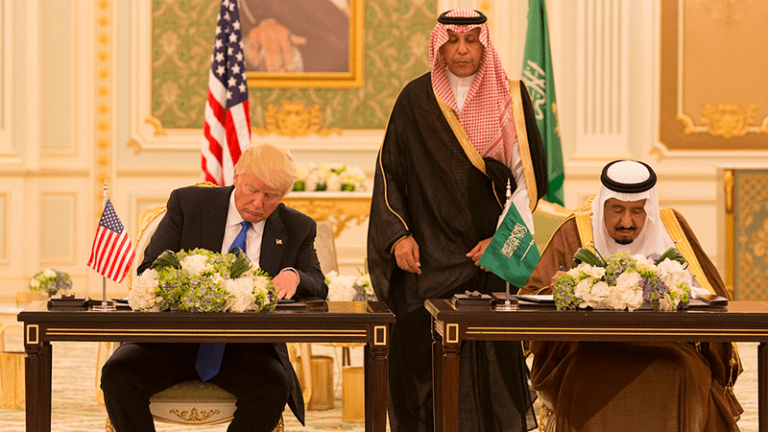
US government policy in the Arabian Peninsula is often maddeningly inconsistent to outside— and inside—observers. A republic such as the United States, which espouses democratic ideals and freedom of thought, is supporting monarchies that disregard those very ideals. The United States seeks to increase regional security collaboration among Gulf Cooperation Council (GCC) states while at the same time expanding bilateral ties with each of them, thus obviating the need for regional collaboration. The United States posts large numbers of troops to the region, sells billions of dollars’ worth of weapons, and at the same time calls for all states in the region to sign peace deals and de-escalate regional tensions.
The American record in the Gulf is one of paradox, misunderstanding, and opacity. In some instances, this is due to American actions. In others, however, outside observers resolutely refuse to study or acknowledge the American bureaucratic structures that shape (and sometimes determine) American action. In this context, no area is more conflicted and misunderstood than weapons sales.
America and Weapons Sales: Not Like Other Countries
Most analysis of American weapons sales—particularly in the Gulf—has lacked rigor. A simple assumption of economic determinism usually passes for analysis: weapons are made in America, weapons are sold to (rich) Arabs, therefore America sells weapons to make money. The arms trade is distasteful to most, and this casual assumption of economic determinism conforms to the worldview and prejudices of the bien-pensant in the West and the Gulf. But this view generally understates other important factors. The bureaucratic structure of American arms sales is designed to impede, and the bureaucracy is structured in such a way that those who approve weapons sales do not have responsibility for economic affairs. From this perspective, there are two facts that underlie arms manufacturing and sales:
- America has less incentive to support arms. Advanced weapons have very large research and development costs. Those lost costs must be recouped by selling production items (airplanes, tanks) in volume. Countries such as the United Kingdom and France do not have buyers who place large enough orders to recover their sunk research costs, unless they export weapons. They cannot produce economically viable weapons if they sell only to themselves, so they must export. The United States, on the other hand, is much bigger and thus can absorb sunk costs without having to export arms. Only when an assembly line for a mature system is about to shut down—for example, when the F-18 production line is closing and the cost of spares for US Navy F-18s is at risk of increasing—does the arms sales bureaucracy consider economic matters.
To be clear, while the defense industry makes a significant proportion of its income through exports, the economic incentives for the US government are less transparent. Country desk officers at the US State and Defense Departments, for example, have no economic incentive to move a sale along. Civil servants and military officers who work on technology release issues are incentivized to disapprove a sale. Lobbying expenditure on behalf of defense companies is well documented, but this is generally limited to members of Congress, who do not make sales but have the power to disapprove them.
- America has more incentive to protect its technology. America’s rivals in high-technology arms exports to the Gulf are generally countries that live under the US security umbrella. They are responsible for their security, but not wholly so. The United States, while appreciating the help of its partners, knows that it is the only guarantor of its security; therefore, it seeks to preserve its advantage in leading-edge technology by restricting exports. Capabilities such as night vision and cryptology are subject to rigorous bureaucratic reviews whose presumption is to deny sales.
And Yet the Weapons Get Sold
In spite of these dragging factors, the number of weapons the United States sells to Arab Gulf countries is truly staggering. During President Donald Trump’s visit to Saudi Arabia in May 2017, over $110 billion worth of weapons sales were announced—this is more than the GDP of Lebanon and Jordan combined. One week into the Gulf crisis, and less than a week after President Trump castigated Qatar as a sponsor of terrorism, Qatar bought $12 billion of American F-15 aircraft. This begs the question: why are these sales made?
- Interoperability: the GCC gold standard. One reason the United States sells weapons to the Gulf is because that’s what the Gulf asks for. Each state in the Gulf knows that there is only one country that has the intention as well as the capability to come to its aid quickly and with significant numbers in times of crisis: the United States. But Gulf countries do not buy weapons just to curry favor with the United States; they also want their armed forces to be compatible with American armed forces. They want to have aircraft that shoot the same missiles, communicate on the same radio frequencies, and network with the same ground- and air-based radar.
If a country buys, say, French Mirage aircraft and then wants to tie into an American network or carry American missiles, a significant amount of effort is required to make the two work together. As weapons become more software dependent, it becomes less likely that this cooperation will happen. For example, to integrate some American systems into a European airplane would require either the Europeans to divulge their source code to American manufacturers, or vice versa. If they can’t agree (and agreement may result in compromise of security information), then the weapons do not get integrated.
Instead of operating in the same space with the same weapons package as an American aircraft, the incompatible aircraft will often be assigned to cover a sector geographically separate from the main fight. This is both expensive and inefficient.
- Bureaucratic Imperatives. A second reason for the multitude of weapons sales is that American officials—civilian and military—working in the region want to show results. They genuinely believe exposure to America is a good thing for Gulf militaries, and they know weapons sales will lead to a persistent presence of American training and support as well as exposure to the American way of life. It is a remarkable act of self-confidence (perhaps narcissism) that Americans feel having foreigners work with Americans, or in the United States, will impart American values. Diplomats and attachés stationed overseas want to show progress: it is always easier and more tangible to conclude an arms sale than, for example, to promote the rights of women.
Areas of Emphasis
With all these caveats in mind, there are several areas in which American military sales and cooperation stand out. Rather than reviewing individual country sales, it is more helpful to look at general areas of cooperation.
- Fighter Aircraft. Every country in the Gulf has purchased or is in the process of purchasing American fighter aircraft. Some of these fleets are formidable: the UAE’s F-16 fleet contains aircraft more advanced than those of the US Air Force. The Saudi F-15 fleet is the largest in the region and has demonstrated impressive (though not perfect) tactical and operational military acumen over a year of war in Yemen. These capabilities will be sustained. The Saudi F-15 upgrade (which included other systems) is still the single largest foreign military sales case made by the US government.Other sales are less significant. The Bahrainis also fly the F-16, but it is an older variant and the country has such small numbers that they are unlikely to play more than a limited role in any coalition operation. The Omanis have a similarly bijoux fleet of F-16s. However, all these are important for the United States, as pilots flying American airplanes have to learn English and generally train in the United States. Logistic systems have to integrate with American systems; American weapons become the natural default for these fighters, and interoperability becomes easier.
The $12 billion sale of F-15 fighters to Qatar should be viewed in this light. The Qatari Air Force has flown French jets; the shift to F-15s will be seismic. Bright young officers hoping to become pilots will have to learn English rather than French; American maintenance contractors and suppliers will replace French ones; and doctrine and capabilities could be expected to follow.
It is much easier for American aircraft to operate from a forward base, one that flies a similar model of aircraft. This way, fueling, arming, and maintenance are greatly simplified. In this respect, selling American aircraft to Gulf Arab states brings tactical and operational advantage to the United States.
-
- Air Defense Missiles. American defense cooperation with the Gulf reaches its apogee in air defense. Bolstered in large part by the performance of the American Patriot missile in Operation Desert Storm, Kuwait and Saudi Arabia have long operated their own Patriot systems. The UAE and Saudi Arabia have used Patriot missiles in combat operations in Yemen and on the Saudi border with Yemen. Qatar has also bought Patriot missiles. Oman uses an American air command and control system, and the UAE and Qatar have both purchased the more sophisticated THAAD missile system. President Trump offered THAAD to the Saudis on his Riyadh trip as well.
These state-of-the-art American missiles require extensive training and maintenance. An officer who expects to rise through the ranks in an air defense service that fields Patriot and THAAD must, quite frankly, learn English and make a career of interacting with Americans with the overall aim of increasing interoperability and tactical agility.
So, Why Do it?
American weapons sales are conducted by bureaucrats who generally do not have responsibility for domestic employment and do not reap financial benefits from the sales they conclude. These bureaucrats are country desk officers or political and military officers in the US State and Defense Departments. They do not have responsibility for maintenance of the defense industrial base, and they do not share in the profits of a sale. There are also review committees at the Department of Defense which ensure that key technology is not compromised, and therefore are incentivized to disapprove a sale.
When the American government sells weapons in the Gulf, it generally does so in response to requests for the weapons and after running a gauntlet of reviews that seek to scrutinize or impede the sales. The gauntlet of reviews that would seek to slow or stop a sale include reviews to see if a weapon capability would be compromised, captured, reverse-engineered, or otherwise used to defeat American weapons used by Americans.
In this context, the sales are made for three reasons. The first is to expand American influence. Fielding sophisticated weapons requires extensive training, support, and logistical networks, so the country providing those services gains influence, albeit in an indirect manner.
The second is to increase interoperability. Having Gulf partners operate weapons that are similar to or the same as American systems allows the United States to focus its assets in the region and to rely on partners to perform missions that Americans would have to otherwise undertake. Every combat air patrol the UAE air force conducts while linked to an American command and control system frees up an American airplane and flight crew.
The final reason is to increase America’s tactical and operational options in a key part of the world. If the United States wishes to rapidly deploy F-15 aircraft to the Gulf, it is much easier to deploy them to a base that already flies the F-15. Procedures, parking, fueling, arming, and maintenance are much easier. America’s options and America’s power thus are enhanced.
The people who sell weapons overseas on behalf of the American government are often likened to George Bernard Shaw’s character Andrew Undershaft: amoral merchants of death. In actuality, many of them are more like Le Carre’s George Smiley—dedicated, undercompensated, rather bland servants of their national interests.
Remarks do not reflect US government views.

